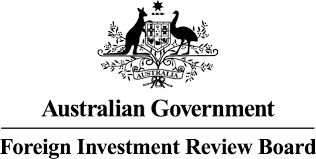AUSTRALIA WELCOMES FOREIGN
REAL ESTATE INVESTORS
Here are the Main Australian Property Investment Rules
Australia welcomes foreign property buyers, but like most countries there are some rules that need to be followed.
There are many reasons a foreign buyer may want to buy a residential property in Australia...
for steady rental income and a sound investment; for accommodation during children's education; for a future home; to take advantage of favourable exchange rates; to diversify risk into a safe haven and for holiday use, amongst others.
THE RULES*
The following guidelines indicate the type of property foreign buyers may purchasein Australia without any limit or restriction:
- Brand New Under Construction Property.
- "OFF-THE-PLAN" Apartments, Flats, Townhouses, Condos, Units.
- New Property not Previously Occupied in the past 12 months.
- Residential Land, Providing a Home is Built Within 4 Years.
- Newly Built Homes.
- Any Commercial Property.
In Australia, foreign investors generally cannot purchase old or secondary sale properties.
FEES: Foreign buyers must pay an FIRB application fee, and Foreign Duty on each transaction. Contact an expert for full details.
Buying property does NOT assist with migration.
*Rules, laws, fees, and regulations can change without notice.

We hope you found the information on this page helpful.
NOW GET YOUR HANDS ON THE MOST COMPREHENSIVE REPORT ON WHETHER NOW IS THE RIGHT TIME TO BUY IN AUSTRALIA.


The Foreign Investment Review Board (FIRB)
FIRB is an Australian government department that assesses applications from foreigners who would like to invest or buy a home in Australia.
Who needs FIRB approval?
Temporary residents
dent You need approval from the FIRB.
- You can only buy one established dwelling, and it must be to live in; however you will be required to sell it once you do not live there anymore.
- You can buy an investment property; however, it must be a new property or vacant land to build a new property.
- You don’t need FIRB approval if you’re buying the property with an Australian citizen as joint tenants and you’re in a spousal relationship. This means it doesn’t apply to other relationships like business partners, mother/father and child, siblings, friends or relatives.
Foreign investors
If you’re NOT an Australian citizen or an approved migrant:
- The you need approval from the FIRB.
- The investment property must be a new property or vacant land to build a new property.
- You can’t buy an established dwelling as an investment property.
- Foreign investors can buy a new property in their name and rent it out to their child that is on a temporary visa.
Exceptions for foreign citizens
However, you are exempt if:
- The property developer has obtained an exemption certificate for the new property that you are buying.
- You inherited the property.
- You were awarded the property by a court order.
- You were awarded the property in a divorce settlement.
Who doesn’t need FIRB approval?
Australian citizens
If you’re an Australian living overseas or Australian Citizen living in Australia:
- You don’t need approval from the FIRB.
- You can buy a new property, existing property or vacant land.
- You can live in the property, or it can be an investment.
Australian permanent resident
If you’re a foreign national who has a permanent resident visa:
- You don’t need approval from the FIRB.
- You can buy a new property, existing property or vacant land.
- You can live in the property, or it can be an investment.
New Zealand citizen
If you’re a NZ Citizen:
You don’t need approval from the FIRB.
- You can buy a new property, existing property or vacant land.
- You can live in the property, or it can be an investment.
- You are not required to be in the country at the time of contract exchange or settlement; however, you may incur a foreigner stamp duty surcharge if you are not in the country at the time of contract exchange. Requirements vary, so it’s best to speak to your relevant state revenue authority for up-to-date information.
Temporary resident buying with an Australian citizen spouse
If you’re on a temporary visa such as a spouse visa, 457 work visa, or student visa and are buying the property with your Australian citizen spouse*:
- You don’t need FIRB approval if you are buying the property as joint tenants and you’re in a spousal relationship. This means it doesn’t apply to other relationships like business partners, mother/father and child, siblings, friends or relatives.
- You’ll need FIRB approval if you are buying the property together as tenants in common.
- You can buy a new property, existing property or vacant land.
- You can live in the property, or it can be an investment.
*Includes de facto partner (both same-sex and different-sex).
Foreigner buying a home with an Australian citizen
- You’re buying a home together as joint tenants and in a spousal relationship. This exemption doesn’t apply to investment properties.
- You must be in a spousal or de facto relationship, i.e. can’t be two family members or relatives.
- You must not be purchasing as tenants in common.
Foreigner buying a home with an Australian permanent resident
- You’re buying a home together as joint tenants and in a spousal relationship. This exemption doesn’t apply to investment properties.
- You must be in a spousal or de facto relationship. You must not be purchasing as tenants in common.

Does buying as an investment or owner-occupied make a difference?
Will it make a difference if you live in the property or not? As a general rule, investment properties are accepted more readily as they help increase the supply of much needed rental accomodation.
If you’re on a temporary visa or work visa then you can:
- Usually buy a new property or an established property.
- Will usually be required to sell your home when you leave Australia.
- If you obtain citizenship or permanent residency, then you won’t have to sell your property.
If you’re a foreign citizen living overseas then you:
- Are unlikely to be allowed to buy a property to live in Australia. This is because you don’t have a valid visa which allows you to stay in Australia.
- If you’ve been granted a temporary residency visa, then you may be able to buy a home before you move.
If you’re an Australian living overseas, you can:
- Buy a property to live in Australia as long as you can prove to your lender that you’ll be able to afford the debt.
- Either you’ll need to prove that you’ll continue your job in Australia or that you have another income source.
Does FIRB charge application fees?
Up until mid-2015, application fees were not required. However, now FIRB charges an application fee to all foreign investors who want to buy land or property in Australia.
The only exception to this is if you’re an Australian citizen, a Permanent Resident or an NZ citizen.
Fees can vary depending on the value of the residential property or land that you want to purchase: As at February 2022:
- $1 million or less: $5,600
- $1 million to $1,999,999: $11,300
- $2 million to $2,999,999: $22,700
- $3 million to $3,999,999: $34,000
- $4 million to $4,999,999: $45,400
- $5 million to $5,999,999: $56,700
- $6 million to $6,999,999: $68,100
- $7 million to $7,999,999: $79,500
- $8 million to $8,999,999: $90,900
- $9 million to $9,999,999: $102,300
Applying for permanent residency/citizenship
Buying and owning real estate in Australia does not in any way help you with your application for citizenship.
Please speak to a migration agent for more information.
At what stage do I need to contact FIRB for approval?
You can’t apply for FIRB “pre-approval” so you should refer to the FIRB guidelines before you begin looking for an Australian property. You can only apply for FIRB approval when you have chosen a specific property to buy.
As long as you’re following the FIRB‘s rules, then it is highly likely that your investment will be approved.
Once you find a property, then you can sign the contract of sale with the condition that allows you to back out of the purchase if FIRB approval is not granted.
However, you can get pre-approval for the mortgage itself before you find a property.
Difference between joint tenants and tenants in common
With few exceptions to requiring approval from FIRB, the devil is in the detail when it comes to buying as a joint tenant versus tenants in common.
What’s the difference between the two?
Joint tenants
This is by the most common way for partners to buy property, and it’s where you and your partner own equal portions in the property (50/50).
The main benefit has to do with estate planning in that in the event either you or partner dies, the survivor will automatically receive the other parties’ portion.
Tenants in common
This is where you specify the portion that you will own in the property and, therefore, this dictates your contributions to the mortgage and dividends from any sale.
This is most common when buying with a friend, business partner or even a relative, rather than a spouse because it offers a level of asset protection.
Rather than the other property owner receiving your portion upon your death, you have the option to nominate someone else.
Why does the government monitor foreign investment?
The government monitors foreign investment to ensure that the investment will benefit Australia. In particular, foreign investors are limited to investing in “new” properties so that their investment adds to the existing housing stock in Australia. This is to prevent speculation, which has little benefit for the Australian economy, and that could result in escalating housing prices.
Did you know that the government approves the vast majority of FIRB approval applications? If you meet the guidelines provided on their website, then there are very few reasons that could cause your application to be declined.
What is the foreigner stamp duty surcharge?
Most Australian states (other than Tasmania and Northern Territory) have introduced a foreign stamp duty surcharge.
Generally speaking, the surcharge applies to foreigners or temporary Australian residents, but there are exceptions to these rules.
For more information and to get expert advice (at no charge) for your personal situation contact the Australian Property Centre below
TOP PAGES
IS NOW THE RIGHT TIME TO BUY?
PROPERTY MANAGEMENT SERVICES
FOREIGN INVESTMENT RULES
AVOIDING INVESTMENT MISTAKES
7 STEP INVESTMENT SYSTEM
The Australian Property Centre, All Rights Reserved
